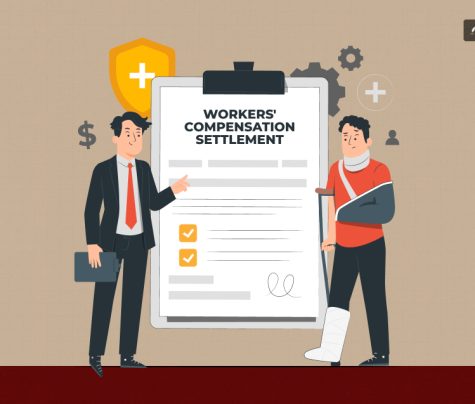
Did you know that the Georgia State Board of Workers’ Compensation alone has more than 34,000 applications to process each calendar year?
Yes, you read that right!
In the Georgia workforce, workplace injuries are a major source of the difficulties that many employees face every year.
For instance, the statistics reflect that in the private sector, employers reported a total of 2.8 million nonfatal workplace injuries and diseases in six weeks’ time. And guess what? Out of these, Georgia reported about 78,000 of those cases.
It is mandatory in Georgia that any business employing three or more workers should have workers’ compensation insurance.
This no-fault system provides medical benefits and replacement of the income lost while protecting employers from civil lawsuits.
“That sounds great! So, how much money will I get under the scheme of workers compensation in Georgia?”
Hi. In today’s blog, this is one of the things that I will be talking about. Therefore, if you are interested to learn more about Georgia’s work comp, you have come to the right place!
Therefore, keep on reading this blog till the end and thank me later…
What Factors Influence Workers Compensation in Georgia?

There are various factors that determine the calculation and payment of the Georgia worker’s compensation benefits process.
As it happens with, the major then follows, the eo, and the employee’s presence at work, and any pre-existing health conditions mainly influence the nature and extent of the injury.
Besides that, claims history and the employee’s insurance policy are the main factors that affect the Workers Compensation in Georgia.
Moreover, the jury also considers factors such as whether the injury occurred in the day and was not due to a job-related illness.
Here are a few things that you should keep in mind:
Severity and Nature of Your Injury
The severity of your injury directly correlates with your settlement value. Georgia classifies workplace injuries into several categories:
- Temporary total disability (TTD): When you cannot work during recovery
- Temporary partial disability (TPD): When you can perform limited work during recovery
- Permanent partial disability (PPD): When you have permanent impairment but can still work
- Permanent total disability (PTD): When you cannot return to any gainful employment
Catastrophic injuries including severe burns, amputations, spinal cord damage resulting in paralysis, and traumatic brain injuries typically result in the highest workers compensation settlements Georgia law permits.
For example, while the average settlement for a minor back strain might range from $10,000-$20,000, catastrophic injuries often settle for hundreds of thousands or even millions when factoring lifetime care needs.
Your Impairment Rating
Your authorized treating physician will assign an impairment rating once you’ve reached maximum medical improvement (MMI).
This rating, expressed as a percentage, follows the American Medical Association’s Guides to the Evaluation of Permanent Impairment.
Georgia law assigns specific values to body parts:
- Arm: 225 weeks
- Hand: 160 weeks
- Thumb: 60 weeks
- Index finger: 40 weeks
- Leg: 225 weeks
- Foot: 135 weeks
- Eye: 150 weeks
- Hearing (one ear): 75 weeks
- Hearing (both ears): 150 weeks
Your settlement calculation multiplies your impairment percentage by the value assigned to the affected body part and your compensation rate.
Injuries to the head, neck, back, and psychological injuries fall under body as a whole ratings, which can substantially complicate settlement negotiations in workers compensation settlements in Georgia cases.
Pre-Injury Average Weekly Wage
Georgia calculates your compensation at two-thirds of your average weekly wage (AWW) for the 13 weeks preceding your injury, subject to maximum limits of $725 per week as of January 2023. Your AWW includes:
- Base salary or hourly wages
- Overtime inclusions
- Bonuses and commissions
- Fringe benefits in some cases
- Concurrent employment
- Seasonal employment considerations
Higher-wage earners often receive larger settlements because their economic losses are greater, even though benefits are capped at the state maximum.
Future Medical Treatment Requirements
When negotiating workers compensation settlements in Georgia, attorneys know that future medical costs significantly impact settlement values. Your settlement should account for:
- Surgeries costs from $20,000 to $150,000 depending on procedure
- Physical therapy between $100 to $300 per session
- Pain management between$1,500to $5,000 annually
- Medication costs between $1,000 to $15,000 annually for serious conditions
- Assistive devices between $500 to $30,000
- Home modifications for serious disabilities of between $5,000 to $100,000
Underestimating these costs can leave you financially vulnerable, while proper calculation significantly increases your settlement value.
Work Capacity and Vocational Considerations
Your ability to return to gainful employment fundamentally affects your settlement value. Georgia recognizes several return-to-work classifications:
- Return to regular duty
- Return with permanent restrictions
- Unable to return to prior employment but can work elsewhere
- Unable to work in any capacity
For workers unable to return to their pre-injury occupation, vocational rehabilitation benefits may be included. The Georgia Department of Labor’s vocational assessment can significantly impact your settlement by establishing:
- Transferable skills
- Wage-earning capacity in alternative positions
- Labor market accessibility
- Retraining requirements
When your injury prevents returning to your established career path, settlements typically include compensation for diminished earning capacity.
Age and Life Expectancy
Your age and life expectancy create substantial variability in settlement values. Younger workers with longer work-life expectancy face greater lifetime economic loss from permanent disabilities, justifying higher settlements.
Life expectancy tables become particularly important when calculating:
- Duration of future medical treatment
- Long-term care requirements
- Total projected earnings loss
Pre-Existing Conditions and Aggravation Claims
Georgia recognizes that workplace injuries aggravating pre-existing conditions are compensable. However, insurance carriers frequently attempt to minimize liability by attributing symptoms to prior conditions. Successfully navigating preexisting condition complications requires:
- Clear documentation of your condition before the work incident
- Medical records establishing causation between work and current symptoms
- Expert testimony distinguishing between natural progression and aggravation
In workers compensation settlements, Georgia law creates specific standards for addressing preexisting conditions, often requiring specialized medical opinions to maximize settlement value.
Claim Documentation Quality
The quality and completeness of your supporting documentation significantly impacts settlement value. Critical documentation includes:
- Initial injury report
- Witness statements
- Medical records from authorized providers
- Diagnostic imaging
- Functional capacity evaluations
- Independent medical examinations
- Work restrictions documentation
Inconsistencies, treatment gaps, or failing to follow medical advice can severely undermine your claim value. Conversely, comprehensive documentation strengthens your negotiating position.
Insurance Carrier Practices
Different insurance companies approach settlements differently. Some factors that influence carrier settlement approaches include:
- Reserve allocations for your specific claim
- Internal policies on settlement authority
- Claims adjuster experience and caseload
- Company risk tolerance
- Previous decisions by Georgia administrative law judges in similar cases
Understanding the particular carrier’s approach allows for more effective negotiation strategies.
Legal Representation and Negotiation Strategy
Multiple studies show that represented claimants receive substantially higher settlements than unrepresented workers. Your attorney’s expertise in:
- Properly valuing complex claims
- Identifying all available benefits
- Navigating medical evidence challenges
- Preparing compelling hearing presentations
- Negotiating effectively with insurers
In Georgia, attorney fees are typically capped at 25% of the settlement, making legal representation accessible while substantially increasing your potential recovery.
Claim Timing and Maximum Medical Improvement
Timing critically affects settlement value. Settling before reaching maximum medical improvement (MMI) typically results in undervalued settlements since the full extent of your condition remains unknown. Strategic considerations include:
- Waiting for full emergence of complications
- Complete diagnostic workup
- Stabilization of your condition
- Clear establishment of work restrictions
- Completion of treatment phases
Patience through this process signals to insurers that you’re serious about receiving fair compensation.
What is the Average Workers Compensation in Georgia?
If you have an accident at work in Georgia, you could get some money to help with the injury. It is said that most people on average receive around $20,000 to $40,000.
But one’s the amount vary based on the severity of the injury. For instance, if:
- You are injured lightly—like a sprain, cut, or a broken bone—you might get $5,000 to $10,000.
- Your injury is very serious—such as a head or spine injury—you can be given $50,000 to $200,000.
- If a death results from the injury at the workplace, undoubtedly, the deceased’s family may take even more.
So, the value of the payment is determined by what happened and how much you were hurt. Every case is unique, and you can have a lawyer to explain it fully to you.
When Will You Get Your Benefits for Workers Compensation in Georgia?
If you cannot work for more than 7 days due to your injury, you may be able to begin receiving weekly payments.
Your first check will be about 21 days from the first day that you were absent from work. But also, the first week you missed can still be paid if you cannot work for over 21 days consecutively.
How Long Can You Receive Workers Compensation in Georgia?
If your injury happened after July 1, 1992, you are qualified for payments for up to 400 weeks (almost 7.5 years).
But, in case your injury is very serious and permanently changes your life, you may receive the benefits for the rest of your life.
Your payments may be cut down or terminated if your doctor confirms that you can go back to work albeit with certain restrictions or without them.
Read Also:
- Employee Rights You Didn’t Know About But You MUST
- Do You Understand the Terms in Your Employment Contract
- Know About the Colorado Employment Law Before You Settle There!











0 Reply
No comments yet.